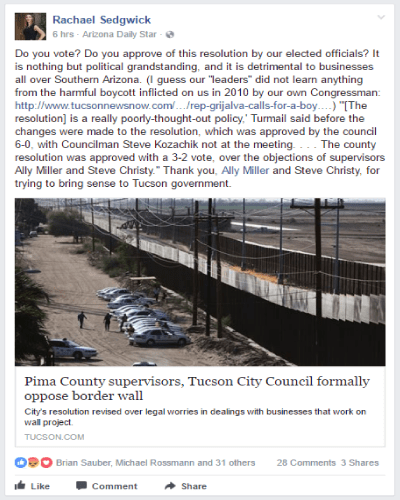On Tuesday, the Tucson Unified School District delayed a vote on whether or not to rescind the Strategic Plan. The plan was developed under former Superintendent H.T. Sanchez, and had never been formally adopted by the Governing Board.
Because the Strategic Plan was never formally adopted, the agenda item requested by Board member Mark Stegeman was perceived by many to be a gratuitous personal attack on Sanchez and his supporters. Stegeman’s statements about Sanchez have put the District in legal jeopardy due to claims that they violate the non-disparagement clause in the termination agreement between Sanchez and the District.
Board member Kristel Foster made claims in a message to constituents prior to the Board meeting in support of the Strategic Plan that were completely false. Foster went so far as to boast that the District had increased enrollment when in fact it is facing a $5 million deficit due to a decrease of enrollment last year of about 500 students.
After a heated and confusing discussion of the item, the Board decided to delay a vote on the matter. The Sanchez related fights between Board members continue to consume a great deal of time, attention, and energy.
Board President Michael Hicks asked his fellow board members to support a resolution calling for both the Tucson City Council and the Pima County Board of Supervisors to stop engaging in activities that he says harm the over 40,000 students and employees of the school district.
Hicks proposed the resolution in response to recent resolutions passed by both the Tucson City Council and Pima County Board of Supervisors, regarding federal actions related to the proposed building of a border wall. Those resolutions condemned the proposed wall, and in the case of the City’s resolution, went so far as to threaten boycotts of any company associated with building the wall.
Prior to making his motion in favor of the resolution, Hicks read the following statement into the record:
“Time and time again we have heard members of the Tucson City Council and the Pima County Board of Supervisors state that they support public education. At the same time, both organizations act in ways that impact the economic stability of our community and by extension our publically funded schools.
It is time for our leaders to understand that we do not live in separate silos. We do not govern in a vacuum. Everything we do affects everything else. It is the schools’ job to graduate students with basic employment skills, it is the government’s job to foster economic opportunity, or at the very least not block it for those students.
We have all seen the Mayor’s pictures of his participation in TUSD’s Steps For Success, and appreciate his effort. However, individual good deeds and public relations opportunities cannot make a meaningful difference if they are undermined by overwhelming oppositional tactics like the resolutions passed by the Tucson City Council and the Pima County Board of Supervisors.
I call on all leaders in the community to sit down and discuss how their current policies and planned actions might impact our schools in the future. I urge my fellow community leaders to engage TUSD board members in constructive dialogue prior to taking steps that send each of our organizations three steps back. I invite members of both the Tucson City Council and Pima County Board of Supervisors to join me in crafting policies that mutually benefit the stakeholders we all represent and answer to.”
Hicks’ motion died for lack of a second.
Hicks, the lone Republican on the Board, expected the Board’s vote to mirror the vote by the Pima County Board of Supervisors, which fell along party lines. Surprisingly Rachael Sedgwick posted a message on Facebook praising the two Republican members of the Pima County Board of Supervisors, who had voted against the resolution. Sedgwick then rejected Hicks’ resolution.
Once again, the administration attempted to have the Board vote on administrators’ contracts that were not available for review. Earlier this year, the Board had been warned by an attorney about the inappropriateness of approving contracts that they had not reviewed, but that warning apparently was ignored by the administration.
Those contacts cover administrators whose functions have little to do with the classroom including one for the Communication director Stephanie Boe for over $96,000. The Board had been expected to not renew those contracts and eliminate the positions, but because of maneuvering by central administration, the Board did not vote on the contracts by the statutorily defined deadline. As a result, the Board has little choice but to renew those contracts.

